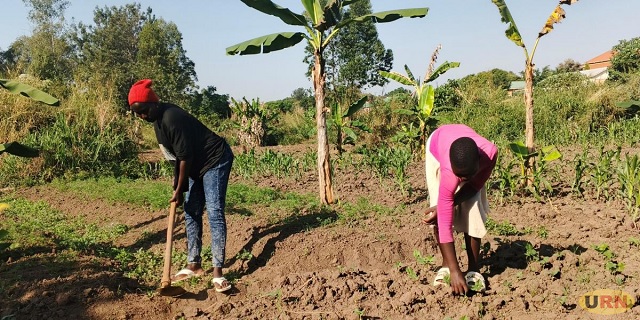
Arua, Uganda | THE INDEPENDENT | Wonder still hovers over friends and neighbors of Charity Kayomirwoth, 31, and her colleagues Margaret Atimango and Gladys Piyic after they successfully turned a bushy, grove-inhabited area along the banks of River Enyau in Arua City into a money-making space.
In January 2003, the three women conceived the idea of starting a vegetable garden in this area following an increased demand for green vegetables in Arua town during the dry season. They picked up their hand hoes and began cultivating an acre of land along the River Enyau valley.
With the help of a security man from the nearby technical institute, the women cleared an acre of land, tilled it, and planted their first set of green vegetables. They were able to realize over UGX 300,000 from ‘Dodo’ and ‘Gobe’ (Cow Peas), as they are locally known.
Kayomirwoth, the leader of the three women, explains that their first income boosted their morale to prepare the land for the second season from April to July and then December to February. Speaking in an interview at their vegetable garden, she says that after realizing life was becoming harder without money, she decided with her colleagues to pick their hoes and go to the valley since there is a ready market in Arua City for the greens.
“We started to plant these vegetables to support ourselves, our children’s school fees, and also supplement our diet at home. In each of the seasons, we get between UGX 300,000 and 600,000, especially during the dry season.” “Sometimes women and even men come to buy the green vegetables from the garden here, and sometimes we take them and sell them in Arua main market,” Kayomirwoth adds.
Meanwhile, speaking in Alur dialect, Margaret Atimango, a colleague of Charity Kayomirwoth, says that after realizing good returns from the sale of the vegetables in their first year, 2023, they decided to join a local savings group, ‘Prosper,’ where they started saving half of their income while the other percentage is spent on purchasing more vegetable seeds for the following season.
“During the dry season, when the demand for green vegetables goes up, we use jugs and saucepans to fetch water from River Enyau and sprinkle it on the vegetables daily. This river has helped us sustain this activity throughout the dry season from December to April,” explained Atimango.
The three women, who are now members of the Prosper Women group in Abirici cell, Onzivu ward, Arua City, have realized improved incomes, which they testified have helped them clothe, pay school fees, cater to the health needs of their families, and join savings groups.
Estimated Earnings by the Prosper Vegetable Growing Women Group
- First season (UGX) (January-March) 600,000-700,000
- Second (June-August) 400,000-500,000
- Third (October-December) 500,000-600,000
Challenges
According to Kayomirwoth, their biggest challenge is pests and diseases, which tend to affect vegetables like cabbages, tomatoes, carrots, and ‘Gobe.’ Since these require chemicals that are relatively expensive for them to buy, their harvests are greatly reduced.
“We try to spray the crops, but this is not enough, and sometimes we leave it to survive like that,” says Kayomirwoth. Other challenges include prolonged dry seasons causing some crops to wither, though they try to mitigate this by manually watering the crops from River Enyau. Additionally, people sometimes steal their crops like cabbage, carrots, tomatoes, and even maize from the garden at night.
“We plan to cultivate more land and plant more types of green vegetables and other cereals like maize, which have a good market during the dry season,” says Gladys Piyic, another colleague of Kayomirwoth. According to the women, they are already preparing to plant more vegetables as soon as the first rains start in March this year so that they are among the first to deliver fresh greens to Arua main market.
During the peak of the rainy season, when River Enyau floods, most of the crops and the topsoil are washed away by flash floods since the gardens are close to the riverbanks. As a way of sensitization, Charity and her colleagues have started the ‘Pick the Hoes and Go to the Valley’ campaign to enable other women to mint money from vegetable growing, which has become lucrative in both urban and rural areas throughout the year.
****
URN
 The Independent Uganda: You get the Truth we Pay the Price
The Independent Uganda: You get the Truth we Pay the Price





